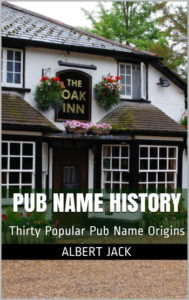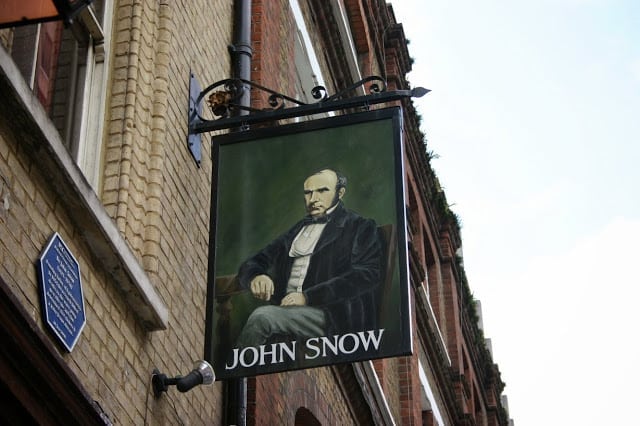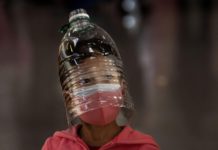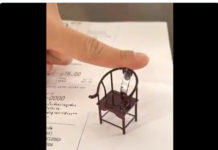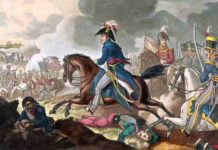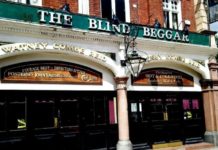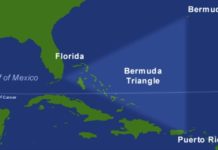There is only one public house by this name, on Broadwick Street in the heart of Soho, and it commemorates a local doctor, one John Snow (1813–58), who managed to save thousands of lives through his quick thinking.
In the mid nineteenth century, London had a vast and growing population and yet no proper sanitation. Many basements had brimming cesspits underneath their floorboards.
The rich paid for water to be brought to their houses, the poorer gathered their own water from local pumps.
This water was generally piped in from the extremely polluted River Thames, which at that time was little better than a vast open sewer. Waterborne disease, unsurprisingly enough, was rife – especially cholera and typhoid – but nobody knew how it was spread.
In August 1854, after several outbreaks of cholera had already sprung up throughout the capital, a major outbreak struck Soho. In its severest form, cholera is one of the most rapidly progressing diseases known to man: without prompt medical intervention, an infected person can die within three hours.
During that outbreak in 1854, 127 people had died within three days. Over the course of the week, three-quarters of the inhabitants had fled, while those that remained were dropping like flies. Dr John Snow, tending the sick, was sceptical about the popular theories of the time, essentially that ‘bad air’, known as ‘miasma’, was responsible for spreading the disease.
But he remained unable to explain exactly how the infection was passed so quickly between people who appeared to have no direct contact with each other.
Marking on a map the homes of as many of the victims as he could find, Snow made a startling discovery. Studying the map, he noticed that 87 of the 89 victims he had identified had all drunk water from a pump in Broad Street.
By contrast, there had been no reports of the death from cholera of anyone who drank water from a different well, even if they lived close to Broad Street.
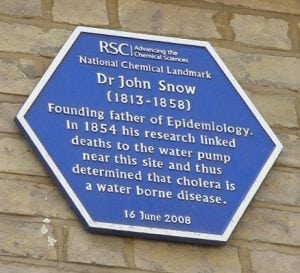 Snow immediately took his findings to the local authorities, urging them to remove the pump handle. The authorities, believing like everyone else that ‘bad air’ was responsible for the disease, were initially reluctant as closing the pump would inconvenience local residents.
Snow immediately took his findings to the local authorities, urging them to remove the pump handle. The authorities, believing like everyone else that ‘bad air’ was responsible for the disease, were initially reluctant as closing the pump would inconvenience local residents.
But Snow managed to persuade them to remove the handle long enough at least for him to investigate further, as a result of which there were no new cases of cholera in the area.
Snow then discovered that the well had been dug only three feet from an old cesspit that had begun to leak sewage directly into the water supply; this, he concluded, must be the source of the disease.
After the epidemic had halted, government officials still refused to acknowledge Snow’s conclusions, terrified that if the public learned they had all been drinking infected water there would be rioting.
In 1848 John Snow had published an essay, On the Mode of Communication of Cholera, in which he suggested the disease was spread by germs and not ‘bad air’. A second edition of the essay, with evidence from the infected water supply in Soho, was published in 1855.
Taken far more seriously than the first edition, it led to a detailed investigation of the public water supply in London and the eventual acceptance that cholera was transmitted through bad water and not bad air.
John Snow rose to greater prominence, too, although he was already well known for his work on anaesthesia, personally administering chloroform to Queen Victoria during the births of her last two children in 1853 and 1857.
Now Londoners had an excuse for not drinking water, and began drinking more beer and wine instead, knowing that the fermentation process would remove all traces of bacteria and so prevent the spread of water-transmitted disease.
This is the reason the expression ‘good health’ is widely used by people having a drink together, because in London in the mid nineteenth century drinking alcohol really was a way of ensuring you didn’t fall ill (or not from cholera, at any rate).
Fittingly, Snow, despite being teetotal all his life, is commemorated by a public house bearing his name, built near the old water pump in Broad (now Broadwick) Street. The beer is fine; and, these days, so is the water. – Albert Jack
Albert Jack AUDIOBOOKS available for download here
